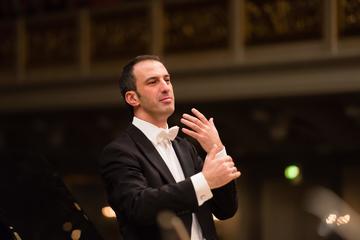

The concert this evening will begin with the Overture to “The Marriage of Figaro”, K. 492. by Wolfgang Amadeus Mozart. The following selection “Air” from the wonderful Orchestral Suite No. 3 in D major by Johann Sebastian Bach is a masterpiece written between 1717 and 1723. This movement features strings and figured bass imitating songlike melodies through lyricism and fully developed thematic voicings. The concert will continue with Beethoven’s “Moonlight Sonata” and “For Elise” – arranged for piano and orchestra and performed by pianist Georgii Cherkin.
The question, who is Elise? refers to the mystery as studied by musicologists and Beethoven biographers. “Elise” is a mistaken title. The musicologist Ludwig Nohl (1831-1885) discovered the original manuscript of “For Elise” in Munich, long after Beethoven’s death. Since that time, the prevailing doctrine states that Nohl read “Elise” by mistake and the real title was “Therese”. Next, the famous Overture to “The Barber of Seville” by Gioachino Antonio Rossini, is a favorite from world opera repertoire.
Georgii Cherkin will return to the stage to perform Mozart’s “Turkish March”, K. 311 specially arranged for piano and orchestra. The concert will conclude with “emphatic knocking” expressed in Beethoven’s Symphony No. 5 in C minor, Op. 67. The masterpiece was reworked countless times and the composer himself wrote that the first movement especially expresses the fundamental idea of his work: “Thus Fate knocks at the door”.
The concert this evening will begin with the Overture to “The Marriage of Figaro”, K. 492. by Wolfgang Amadeus Mozart. The following selection “Air” from the wonderful Orchestral Suite No. 3 in D major by Johann Sebastian Bach is a masterpiece written between 1717 and 1723. This movement features strings and figured bass imitating songlike melodies through lyricism and fully developed thematic voicings. The concert will continue with Beethoven’s “Moonlight Sonata” and “For Elise” – arranged for piano and orchestra and performed by pianist Georgii Cherkin.
The question, who is Elise? refers to the mystery as studied by musicologists and Beethoven biographers. “Elise” is a mistaken title. The musicologist Ludwig Nohl (1831-1885) discovered the original manuscript of “For Elise” in Munich, long after Beethoven’s death. Since that time, the prevailing doctrine states that Nohl read “Elise” by mistake and the real title was “Therese”. Next, the famous Overture to “The Barber of Seville” by Gioachino Antonio Rossini, is a favorite from world opera repertoire.
Georgii Cherkin will return to the stage to perform Mozart’s “Turkish March”, K. 311 specially arranged for piano and orchestra. The concert will conclude with “emphatic knocking” expressed in Beethoven’s Symphony No. 5 in C minor, Op. 67. The masterpiece was reworked countless times and the composer himself wrote that the first movement especially expresses the fundamental idea of his work: “Thus Fate knocks at the door”.











